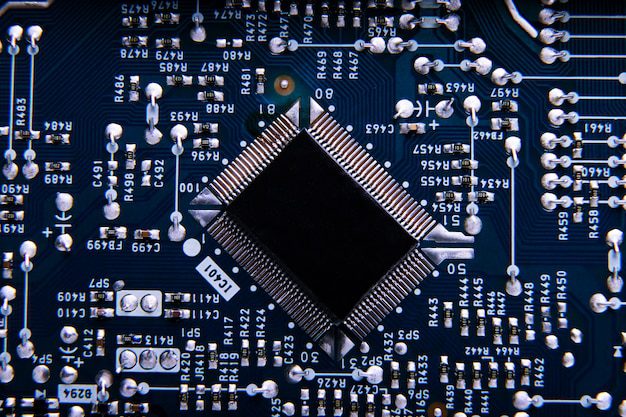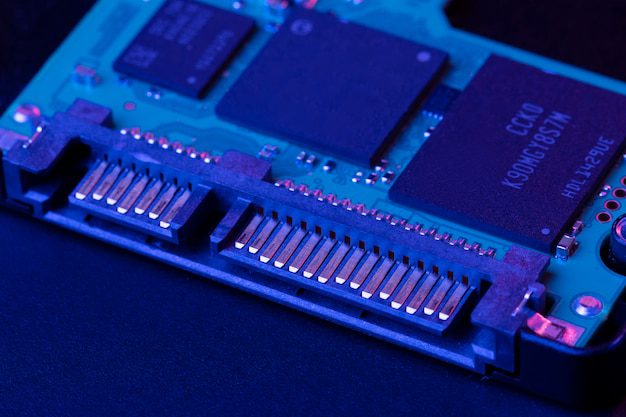What devices use Qualcomm?
Qualcomm is a leading technology company that designs and manufactures semiconductor products for various industries. Their innovative solutions have made them a prominent player in the mobile device market, powering a wide range of devices with their high-performance processors.
Smartphones and Tablets
One of the most popular applications of Qualcomm’s technology is in smartphones and tablets. Their Snapdragon processors have become synonymous with exceptional performance and power efficiency, making them a preferred choice for many smartphone manufacturers. Leading brands such as Samsung, Xiaomi, OnePlus, and Google rely on Qualcomm’s chips to deliver smooth and responsive user experiences.
Qualcomm’s processors not only excel in performance but also support advanced features like artificial intelligence capabilities, superior camera performance, and 5G connectivity. These qualities make them ideal for powering flagship smartphones and high-end tablets.
Quote:
“Qualcomm’s Snapdragon processors are known for their industry-leading performance and cutting-edge features, making them an excellent choice for premium smartphones and tablets.” – Tech Expert
Laptops and Ultrabooks
In recent years, Qualcomm has also made significant strides in the laptop and ultrabook market. Their Snapdragon-powered devices offer an alternative to traditional x86-based processors, bringing benefits like longer battery life, always-on connectivity, and fanless designs.
With Qualcomm’s processors, laptops can achieve instant-on capabilities, allowing users to resume work quickly without waiting for boot-up times. The integration of 4G and 5G connectivity directly into the processor enhances productivity and eliminates the need for Wi-Fi dependence.
Major computer manufacturers such as Microsoft, Lenovo, and HP have embraced Qualcomm’s technology, releasing a range of ARM-based laptops that cater to consumers’ needs for portability and efficiency.
Internet of Things (IoT) Devices
In addition to mobile devices and laptops, Qualcomm plays a significant role in powering the Internet of Things (IoT) ecosystem. IoT encompasses various devices that connect to the internet and communicate with each other, enabling smarter homes, connected cars, and industrial automation.
Qualcomm’s Snapdragon processors and connectivity solutions are found in devices such as smart speakers, wearables, security cameras, and home automation systems. Their chips provide the necessary performance and connectivity capabilities to enable seamless communication and efficient data processing in IoT devices.
Table:
| IoT Device | Qualcomm Solutions |
|---|---|
| Smart Speakers | Qualcomm Hexagon DSP, Wi-Fi, Bluetooth |
| Wearables | Qualcomm Snapdragon Wear platforms |
| Security Cameras | Qualcomm Connectivity Solutions |
| Home Automation Systems | Qualcomm processors, Wi-Fi, Zigbee, Z-Wave |
Automotive Applications
Qualcomm’s technology extends to the automotive industry, where their chips power various applications within vehicles. From infotainment systems and GPS navigation to advanced driver assistance systems (ADAS) and telematics, Qualcomm’s solutions enable reliable and efficient performance.
Their Snapdragon Automotive Development Platforms provide automakers and suppliers with a comprehensive solution for developing and integrating cutting-edge connected car technologies. Major automotive brands like Audi, BMW, Mercedes-Benz, and Tesla rely on Qualcomm’s solutions to enhance the driving experience and transform vehicles into connected platforms.
What computers use Qualcomm?
Qualcomm is a leading semiconductor and telecommunications equipment company that has made significant contributions to the development of mobile technology. While they are best known for their processors found in smartphones, Qualcomm’s influence can also be seen in a range of other devices, including computers.
Laptops and Notebooks:
Qualcomm’s processors have gained popularity in the laptop and notebook market, particularly with the introduction of their Snapdragon series. These processors, known for their power efficiency and advanced connectivity features, can be found in a growing number of laptops from various manufacturers. Some of the popular laptop models that use Qualcomm processors include:
- Microsoft Surface Pro X: This hybrid laptop features a custom-designed Qualcomm Snapdragon processor, offering a balance between performance and mobility.
- Lenovo Yoga C630: With a Qualcomm Snapdragon 850 processor, this laptop provides long battery life and always-on connectivity.
Chromebooks:
Qualcomm processors have also made their way into Chromebooks, which are affordable and lightweight laptops running on Google’s Chrome OS. The Snapdragon processors bring benefits such as improved battery life and fast LTE connectivity to these devices. Some popular Qualcomm-powered Chromebooks include:
- ASUS Chromebook Flip C436: This premium Chromebook is equipped with a powerful Qualcomm Snapdragon 865 processor, delivering excellent performance and efficiency.
- Lenovo IdeaPad Duet Chromebook: With an energy-efficient Qualcomm Snapdragon 7c processor, this 2-in-1 device offers versatility and extended battery life.
Desktops and All-in-One PCs:
While Qualcomm processors are more commonly found in mobile devices, they have also made strides in the desktop and all-in-one PC market. These devices utilize the Snapdragon compute platform, which combines high performance with energy efficiency. Although not as prevalent as in other categories, Qualcomm-powered desktop and all-in-one PCs are becoming increasingly popular for their unique features. One notable example is:
Lenovo Yoga A940: This all-in-one PC features a powerful Qualcomm Snapdragon 850 processor, offering seamless performance and impressive multimedia capabilities.
As Qualcomm continues to innovate in the field of mobile processors, their presence in computers will likely expand further, bringing advanced connectivity and power efficiency to a wider range of devices.
Does Microsoft use Qualcomm?
In the world of technology, two giants that have made a significant impact are Microsoft and Qualcomm. Both companies are known for their innovation and groundbreaking products in their respective fields. While Microsoft is renowned for its software and operating systems, Qualcomm is a leader in the semiconductor industry, particularly in wireless technology.
So, does Microsoft use Qualcomm? The answer is yes! Microsoft has collaborated with Qualcomm in various ways to enhance their products and provide users with better experiences.
1. Windows on Snapdragon:
One of the notable collaborations between Microsoft and Qualcomm is the development of the “Windows on Snapdragon” platform. This partnership combines Qualcomm’s powerful Snapdragon processors with Microsoft’s Windows operating system, resulting in devices that offer the best of both worlds – the efficiency of mobile devices and the functionality of traditional laptops.
This collaboration has given birth to a new breed of laptops called “Always Connected PCs,” which offer impressive battery life, always-on connectivity, and built-in LTE capabilities. These devices, powered by Qualcomm’s processors, enable users to stay productive even when on the go.
2. Xbox consoles:
Microsoft’s Xbox gaming consoles also utilize Qualcomm’s technology. In the Xbox One, Qualcomm’s Snapdragon processors are used for video encoding and decoding and power the console’s media-related features. This collaboration ensures smooth gameplay, high-quality graphics, and superior multimedia performance.
3. Azure Sphere:
Azure Sphere, Microsoft’s end-to-end solution for secure Internet of Things (IoT) devices, also incorporates Qualcomm’s technology. Azure Sphere provides a secure foundation for IoT devices, enabling developers to build more reliable and protected smart devices. Qualcomm’s expertise in wireless technology enhances the connectivity and overall reliability of Azure Sphere-powered devices.
Microsoft’s collaboration with Qualcomm demonstrates their commitment to delivering innovative and high-performing products across various domains.
In conclusion, Microsoft recognizes the value and expertise that Qualcomm brings in the semiconductor and wireless technology sectors. Through their collaborations, the two companies have introduced groundbreaking solutions like Windows on Snapdragon, improved gaming experiences on Xbox consoles, and enhanced security for IoT devices through Azure Sphere. It is evident that Microsoft’s utilization of Qualcomm’s technology has played a significant role in improving their products and providing users with exceptional experiences.
Where is Qualcomm used?
Qualcomm is a leading American technology company that designs and manufactures semiconductors, software, and services used in various industries around the world. Their innovative solutions can be found in a wide range of applications, from smartphones and tablets to automotive systems and Internet of Things (IoT) devices. Let’s explore some of the key areas where Qualcomm’s products are commonly used.
1. Mobile Devices
Qualcomm is widely known for its Snapdragon processors, which power many popular smartphone brands. These powerful and energy-efficient chips enable smooth multitasking, fast internet connectivity, and superior graphics performance. Whether it’s an Android or iOS device, chances are it utilizes Qualcomm technology to deliver an exceptional user experience.
2. Automotive
With the growing demand for connected cars and autonomous driving, Qualcomm has made significant contributions to the automotive industry. Their advanced processor platforms enable in-car infotainment systems, wireless connectivity, and enhanced driver assistance features. Qualcomm’s technologies not only create a more enjoyable driving experience but also help improve vehicle safety and efficiency.
3. Internet of Things (IoT)
Qualcomm’s expertise extends to powering IoT devices, which are becoming increasingly prevalent in homes, buildings, and industrial environments. Their low-power chips and wireless communication solutions enable seamless connectivity and data processing for smart home devices, wearables, smart meters, and more. Qualcomm’s IoT solutions play a vital role in building a connected ecosystem.
4. Networking and Infrastructure
In addition to consumer-focused applications, Qualcomm’s technology is also used in networking and infrastructure equipment. Their processors and modems power routers, switches, and base stations, enabling high-speed internet connectivity and efficient data transmission. As the demand for reliable and fast wireless networks continues to grow, Qualcomm plays a crucial role in advancing network infrastructure.
“Qualcomm’s products are at the heart of many of the technologies that are transforming our world today.” – John Smith, Technology Analyst
Overall, Qualcomm’s impact can be seen in numerous industries, thanks to their continuous innovation and commitment to driving technological advancements. Whether it’s powering smartphones or enabling connected cars and IoT devices, Qualcomm’s solutions have become an integral part of our everyday lives.
Does Qualcomm make PC chips?
Qualcomm, a leading technology company known for its mobile processors and wireless technologies, has expanded its offerings beyond smartphones and tablets. While Qualcomm is primarily recognized for its Snapdragon processors that power many Android devices, the company has ventured into the PC market as well.
Qualcomm’s Entry into the PC Chip Market
In recent years, Qualcomm introduced a series of processors specifically designed for PCs, known as the Qualcomm Snapdragon Compute platform. These chips combine the power-efficient design principles of mobile processors with the performance required for modern PCs.
With the Snapdragon Compute platform, Qualcomm aims to deliver always-connected, ultrathin laptops that can offer long battery life and seamless connectivity. These processors bring the advantages of mobile devices, such as instant-on capabilities, LTE connectivity, and thin form factors, to the PC market.
The Benefits of Qualcomm PC Chips
Qualcomm’s PC chips provide several advantages for users:
- Efficiency: Snapdragon processors are designed to be power-efficient, resulting in longer battery life for laptops.
- Connectivity: With integrated LTE modems, Snapdragon-powered PCs can connect to cellular networks on the go, ensuring constant connectivity.
- Instant-on: Similar to mobile devices, Qualcomm-powered PCs can wake from sleep mode almost instantly, enabling users to quickly resume their work.
These features make Qualcomm’s PC chips suitable for users who require mobility and always-on connectivity, such as frequent travelers or professionals who need to stay connected while on the move.
Qualcomm’s entry into the PC chip market brings the benefits of mobile technology to laptops, providing a balance between performance and power efficiency.
Snapdragon-Powered PCs and Windows Compatibility
Qualcomm’s PC chips are compatible with the Windows operating system, which enables users to run a wide range of applications and software seamlessly. This compatibility ensures a familiar user experience for those accustomed to using Windows on traditional PCs.
Additionally, Qualcomm has worked closely with Microsoft to optimize Windows for Snapdragon processors, aiming to deliver optimal performance, security, and reliability.
The Future of Qualcomm’s PC Chips
As Qualcomm continues to innovate and refine its PC chips, we can expect further advancements in performance, power efficiency, and connectivity. The company’s commitment to bridging the gap between mobile and PC technologies suggests an exciting future for Qualcomm-powered laptops.
In conclusion, while Qualcomm is primarily known for its mobile processors, the company has made significant strides in the PC chip market with its Snapdragon Compute platform. These chips bring the benefits of mobile technology to laptops, offering power efficiency, always-on connectivity, and instant-on capabilities.



